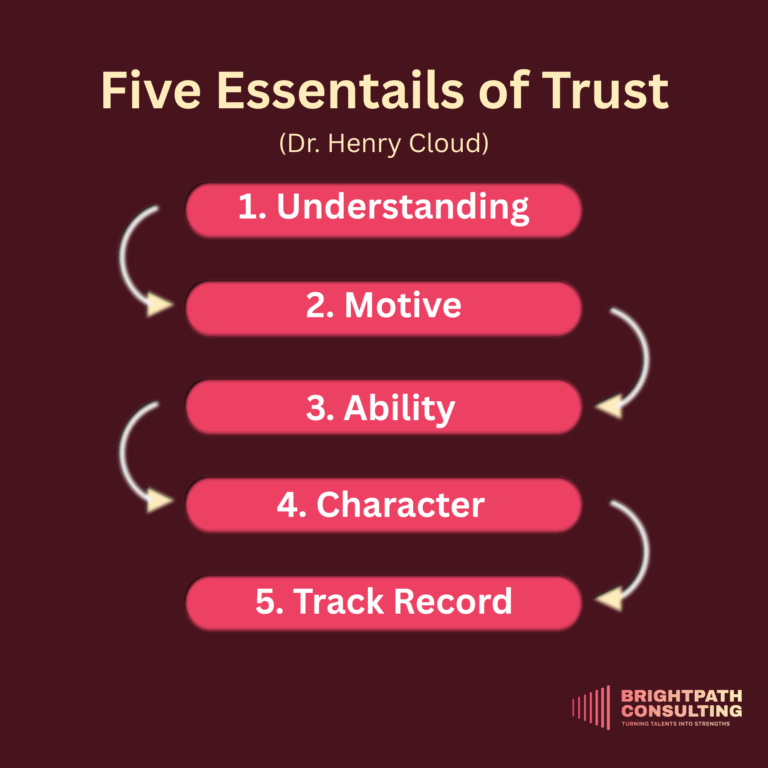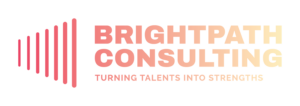Have you ever had a “perfect” idea that just didn’t gain traction or rubbed people the wrong way? You’re not alone—every day people have great ideas but for some reason those ideas don’t work out. No matter how good our intentions are, we may not get the necessary support.
In this issue we will take a look at how self-awareness and our own biases might affect such a situation. I am also sharing a simple framework for building trust by Dr. Henry Cloud that I’ve been using to rethink how I build trust in the first place.
What are our topics for today?
- Self-Awareness: Solutions Don’t Start With Asking ‘What Went Wrong?’ But ‘How did I Affect What Went Wrong?’
- The Five Essentials of Trust
- Self-Reflection: Broken Trust
Self-Awareness
Sometimes our best intentions are our worst enemies.
I want you to think about a situation where you had the perfect idea and you started working on it. But not too many hours in, you realized that you were the only one driving your idea forward even though it affected many others. Everyone would benefit from the results, so why in the world am I not getting any support? The idea is actually starting to cause friction and difficulties while it was supposed to make everything better.
Who can relate to a situation like this?
So, here we are, with the perfect idea but no traction, following or support. The people we work with show no enthusiasm for the idea, they don’t show any initiative and nothing really moves forward. We slowly feel the frustration building up inside of us. We think “They just don’t get it.”, or “How is this not important to them?”
This often leaves us with two options:
#1 I’ll just do it myself. (…because I know how important this is)
#2 If it’s not important to you, why should it be important to me? We are done.
Option #1 is not healthy because it adds to our plate and for most of us, our plates are already more than full. Picking up the “slack” is not the solution.
Option #2 keeps the status quo with the caveat that we are now getting frustrated every time a similar topic comes up.
Having had many conversations around topics like this, it strikes me that we often expect others to see things through the same lens as we do. There is that subconscious expectation that things that are clear to us should be clear to others, too.
If we want more effective and collaborative workplaces:
THE LONG TERM SOLUTION TO THE PROBLEM DOESN’T START WITH ‘WHAT WENT WRONG?’ BUT ‘HOW DID I AFFECT WHAT WENT WRONG, AND HOW DO I ENSURE I FIX THAT IN THE FUTURE?’
To be successful, it involves having a different discussions with our peers and with the team. If we want results in business– we don’t need to aim at tasks, we need to have effective approaches to people who are working on those tasks.
This is the foundational step in personal and professional growth. The willingness to look in a mirror, accept what we see and work with what we have. If we aim at self-awareness, we can begin to make the steps necessary to change outcomes.
The Five Essentials of Trust
Recently I came across the book Trust by Dr. Henry Cloud and I found it enlightening when he explained the five essentials of trust. They are simple, yet so powerful – when you take the time to consciously consider them when making decisions that require trust.
Those five essentials really stuck with me as I recently experienced a situation where trust was broken and I realized that it was my own fault because I didn’t do my homework of thoroughly vetting someone.
Let me share the Five Essentials of Trust with you – If you want to determine if you can trust someone, look at the following elements (in order):
1. Understanding – Trust does not start by convincing someone, instead they need to show that they understand your individual ‘why’. Does the person make a conscious effort to get to know you and your situation? To really understand, they need to consider what we feel, think, need, desire and fear.
2. Motive – Motive is about the their priorities and what’s important to them and what they care about – In essence: “Why is this person wanting to help me?” and “Do their motives align with me and my values?”
3. Ability – We need to consider their ability in the SPECIFIC context of our task, not in general terms. This can be an issue when we work with people we like – they possess the general ability but not necessarily in our specific context. Ask for proof and specific examples that match your specific need.
4. Character – Character is specific to the task at hand – different tasks may require different characters. Think of things like kindness, predictability, honesty, openness, or perseverance. This is basically the person’s moral compass and drives their decision-making. Also, seeing people manage themselves, others and tasks is a great indicator for character. Emotional Intelligence is a big part of character and shows how people react in different situations.
5. Track Record – Having a solid track record shows reliability. A good indicator for the future is past performance. Look for concrete and objective proof in a comparable environment that the task at hand can be completed.

In my specific case, I skipped over those elements because I was too excited and wanted to move forward fast. In hindsight, I missed the very first step, the foundational piece of Understanding was not there. When I said or described something, I thought I was understood but it turned out that we could not have been farther away from each other.
My personal lesson is to slow down and take the necessary time to make a good decision. No matter how big the excitement is, being thorough in the beginning saves a big headache in the end.
Self-Reflection
Earlier we were already talking about trust, so I want to take a minute and direct our self-reflection to this topic as well
So, let’s try the following:
- Think about a situation where your trust was broken.
- Can you pinpoint the reason to one of the five essentials? If so, to which one?
- What can you learn from this situation and what can you do better next time given the area the trust was broken?
Taking a few moments for self-reflection helps make us aware of our impact and provides an opportunity to appreciate our growth.
Give it a shot, try it out.
Even consider writing down your responses. Going back through those notes can really lift you up when you have a bad day or help when you are facing self-doubts.

